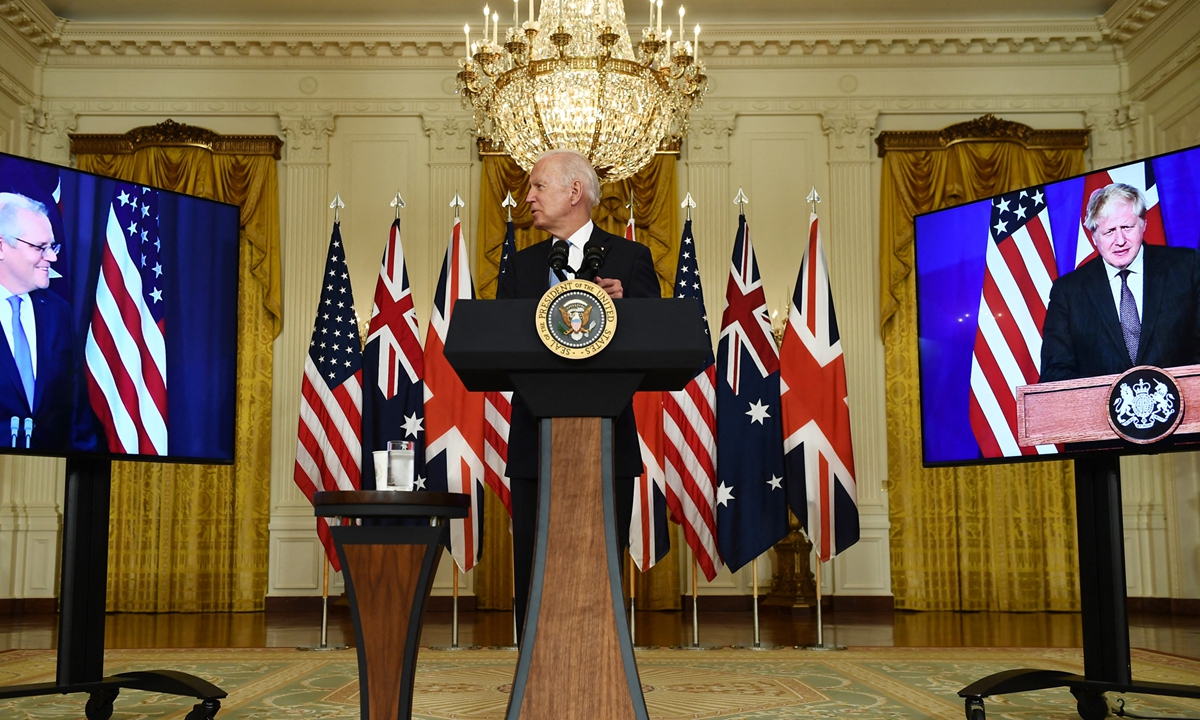
US President Joe Biden participates in a virtual press conference on national security in the White House in Washington, DC, on Wednesday US time, with British Prime Minister Boris Johnson (right) and Australian Prime Minister Scott Morrison in attendance via video link. Biden announced that the US is forming a new Indo-Pacific security alliance with the UK and Australia. Photo: AFP
The US, the UK and Australia suddenly announced the establishment of a trilateral security partnership called AUKUS. This is like forming an Indo-Pacific version of a "small NATO" and has caused a series of shocks. France reacted most strongly because it was robbed of the A$90 billion submarine contract it reached with Australia. French Foreign Minister Jean-Yves Le Drian publicly criticized the deal as a "stab in the back."
The complicated feelings of US allies go far beyond this. This new trilateral alliance highlights the Anglo-Saxon ancestry, making all other US allies strongly feel an order of distance and closeness with Washington. The Five Eyes used to be the alliance within the US' foreign alliances, and now even the Five Eyes are left with only "three eyes," not to mention how far behind European countries such as France and Germany would rank in the US' list.
Not long ago, the US was seriously pushing for the Quad among the US, Japan, India and Australia. But compared with AUKUS, the Quad seems to be so marginal and amounts to almost nothing. The US even shares its nuclear submarine technology with Australia, while India has been dreaming of this technology. The Quad seems to be a mechanism tailored specifically for India by the US to rope in India and make it focus on confronting China. Washington does not prepare to build up India's strength through Quad. Instead, it wants India and China to consume each other.
The term "Indo-Pacific" was rarely used in the past. But now, the US has made it the world's most popular geopolitical phrase. However, different countries have varying interests in the region, and most of them maintain close ties with China. The US has been trying many grandiose things in the region for years, but it has gained very little. For example, it cannot make regional countries reduce their economic and trade ties with China, nor can it make those countries rely on Washington's support to confront China militarily.
The forming of AUKUS at least revealed that the US lacks confidence in its strategy of widely roping in almost any country into an anti-China united front. Washington knows that strategy consumes a lot of energy, but produces very little effect. In addition, the US wants to make Australia an example of a "faithful lapdog" for others to see: Listen to everything the US says and the US will even give you nuclear submarines. Certainly, this is a very profitable process for the US.
In just a few years, the US has developed two alliances or quasi-alliance mechanisms in the Indo-Pacific region: AUKUS and the Quad. Such flip-flopping is probably unprecedented in geopolitical history.
Washington has always put its own interests first, trying its best to play a zero-sum game with China and demanding other countries to maximize their zero-sum relationship with China. However, the US' own interests with China are complicated and are difficult to cut. There are also many countries in the middle that are living in a globalized way. Washington itself has become dizzy and worrying about gains and losses in these complicated interests relationships.
With AUKUS this time, what does the US really want to do? Will this help realize Biden's goal of organizing a "unified front" against China? Look at how angry France is and how confused the EU is, especially after lingering disappointment over the US' unilateral decision to pull troops from Afghanistan. How do the two discarded "eyes," namely Canada and New Zealand, feel? And how about India, which has become more marginalized? It's really hard to say that the US alliance strategy "gets a point."
People in different societies have similar experiences: They will make substantive efforts, if something can be pushed forward. But if something cannot be pushed forward and people still want to show as if they've done something, they will play tricks. What the US wants the most right now is for all countries to decouple from China economically and confront China militarily. It cannot achieve that, so it's making great efforts in playing tricks. That's called bluffing.
The US is doomed to pay the price if it doesn't follow the laws of the globalization era, and stubbornly attempts to draw history back and start Cold War-style confrontation. The US decision to provide Australia with nuclear submarine technology has poked a big hole in the nuclear non-proliferation system, which has benefited the US and the West the most in terms of security. Washington flaunts its strength on the spur of the moment, but history will surely nail the incumbent US government's ugly move on the pillar of shame.
